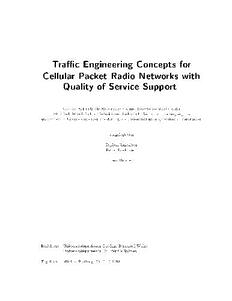Download Traffic Engineering Concepts for Cellular Packet Radio Networks with Quality of Service Support PDF Free - Full Version
Download Traffic Engineering Concepts for Cellular Packet Radio Networks with Quality of Service Support by Stuckmann P. in PDF format completely FREE. No registration required, no payment needed. Get instant access to this valuable resource on PDFdrive.to!
About Traffic Engineering Concepts for Cellular Packet Radio Networks with Quality of Service Support
This thesis presents traffic engineering concepts for cellular packet radio networks that are applied but not limited to the standards GPRS and EGPRS and can be integrated into the radio interface capacity planning process. They are based on a comprehensive performance evaluation of Internet and Multimedia applications for the relevant cell scenarios, system parameter settings and protocol options that are expected for the evolution of GPRS and EGPRS networks. Additionally, optimized algorithms for traffic management and quality of service management, comprising connection admission control as well as scheduling, are developed. Their performance is evaluated and compared to existing implementations. From the traffic performance analysis, based on the existing and optimized system models, traffic engineering rules are derived. They can be used for quantitative radio interface dimensioning by network operators, equipment vendors or system integrators. Examples for the application of the traffic engineering rules are presented for GPRS evolution scenarios and an EGPRS introduction scenario. While the examples are based on the existing standards GPRS and EGPRS, the concepts developed in this thesis are valid for all packet radio networks.
Detailed Information
| Author: | Stuckmann P. |
|---|---|
| Publication Year: | 2003 |
| ISBN: | 140561 |
| Pages: | 221 |
| Language: | English |
| File Size: | 5.257 |
| Format: | |
| Price: | FREE |
Safe & Secure Download - No registration required
Why Choose PDFdrive for Your Free Traffic Engineering Concepts for Cellular Packet Radio Networks with Quality of Service Support Download?
- 100% Free: No hidden fees or subscriptions required for one book every day.
- No Registration: Immediate access is available without creating accounts for one book every day.
- Safe and Secure: Clean downloads without malware or viruses
- Multiple Formats: PDF, MOBI, Mpub,... optimized for all devices
- Educational Resource: Supporting knowledge sharing and learning
Frequently Asked Questions
Is it really free to download Traffic Engineering Concepts for Cellular Packet Radio Networks with Quality of Service Support PDF?
Yes, on https://PDFdrive.to you can download Traffic Engineering Concepts for Cellular Packet Radio Networks with Quality of Service Support by Stuckmann P. completely free. We don't require any payment, subscription, or registration to access this PDF file. For 3 books every day.
How can I read Traffic Engineering Concepts for Cellular Packet Radio Networks with Quality of Service Support on my mobile device?
After downloading Traffic Engineering Concepts for Cellular Packet Radio Networks with Quality of Service Support PDF, you can open it with any PDF reader app on your phone or tablet. We recommend using Adobe Acrobat Reader, Apple Books, or Google Play Books for the best reading experience.
Is this the full version of Traffic Engineering Concepts for Cellular Packet Radio Networks with Quality of Service Support?
Yes, this is the complete PDF version of Traffic Engineering Concepts for Cellular Packet Radio Networks with Quality of Service Support by Stuckmann P.. You will be able to read the entire content as in the printed version without missing any pages.
Is it legal to download Traffic Engineering Concepts for Cellular Packet Radio Networks with Quality of Service Support PDF for free?
https://PDFdrive.to provides links to free educational resources available online. We do not store any files on our servers. Please be aware of copyright laws in your country before downloading.
The materials shared are intended for research, educational, and personal use in accordance with fair use principles.

